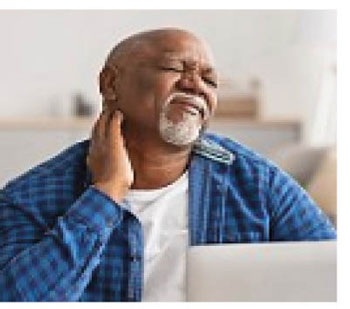A pinched nerve is an informal term and not a true medical term. It is used to describe one type of damage or injury to a nerve or set of nerves. The injury may result from compression, constriction, or stretching.Symptoms include:
Numbness
“Pins and needles” or burning sensations Pain radiating outward from the injured areaOne of the most common examples of a single compressed nerve is the feeling of having a foot or hand “fall asleep.” A pinched nerve frequently is associated with pain in the neck or lower back. This type of pain can be caused by inflammation or pressure on the nerve root as it exits the spine. If the pain is severe or lasts a long time, you may need to have further evaluation from your physician.
Several problems can lead to similar symptoms of numbness, pain, and tingling in the hands or feet but without pain in the neck or back. These can include peripheral neuropathy, carpal tunnel syndrome, and tennis elbow. The extent of such injuries may vary from minor, temporary damage to a more permanent condition.
Early diagnosis is important to prevent further damage or complications. A pinched nerve is a common cause of an on-the-job injury.
The most frequently recommended treatment is rest for the affected area. Nonsteroidal anti-inflammatory drugs (NSAIDs) or corticosteroids may be recommended to help alleviate pain. Physical therapy is often useful, and splints or collars may be used to relieve symptoms. Depending on the cause and severity of the pinched nerve, surgery may be needed.
With treatment, most people recover from pinched nerve. However, in some cases, the damage is irreversible.
Learn About Clinical Trials Clinical trials are studies that allow us to learn more about disorders and improve care. They can help connect patients with new and upcoming treatment options.
How can I or my loved one help improve care for people with a pinched nerve?
Consider participating in a clinical trial so clinicians and scientists can learn more about pinched nerves and related disorders. Clinical research uses human volunteers to help researchers learn more about a disorder and perhaps find better ways to safely detect, treat, or prevent disease.
All types of volunteers are needed—those who are healthy or may have an illness or disease—of all different ages, sexes, races, and ethnicities to ensure that study results apply to as many people as possible, and that treatments will be safe and effective for everyone who will use them.










